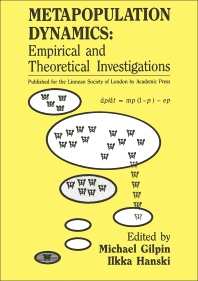Metapopulation Dynamics: Empirical and Theoretical Investigations covers the 1989 proceedings of a metapopulation dynamics workshop held at Lammi Biological Station, Helsinki, Finland. It is divided into 18 chapters that cover various approaches to spatially structured population and community dynamics. After briefly discussing the history of metapopulation ideas and the major conceptual links, the book covers types of studies that have been conducted on single-species and multispecies metapopulations. Then, it examines the relationships between metapopulation dynamics, the equilibrium theory of island biogeography, and the dynamics of populations living in patchy environments. It further tackles practical issues and the links between metapopulation dynamics and landscape ecology, and between metapopulation dynamics and conservation biology. Chapters 4 and 5 present structured models describing changes in the number of individuals within patches and an empirical evaluation of local extinction in metapopulation studies. The subsequent chapters discuss several aspects of metapopulation, including dispersal and connectivity, colonization, conspecific attraction, extinction and isolation, and forest fragmentation. The latter chapters describe the concept of habitat fragmentation, the diversity and competition in metapopulations, the community collapse, and the effects of metapopulation studies in predator-prey systems.
